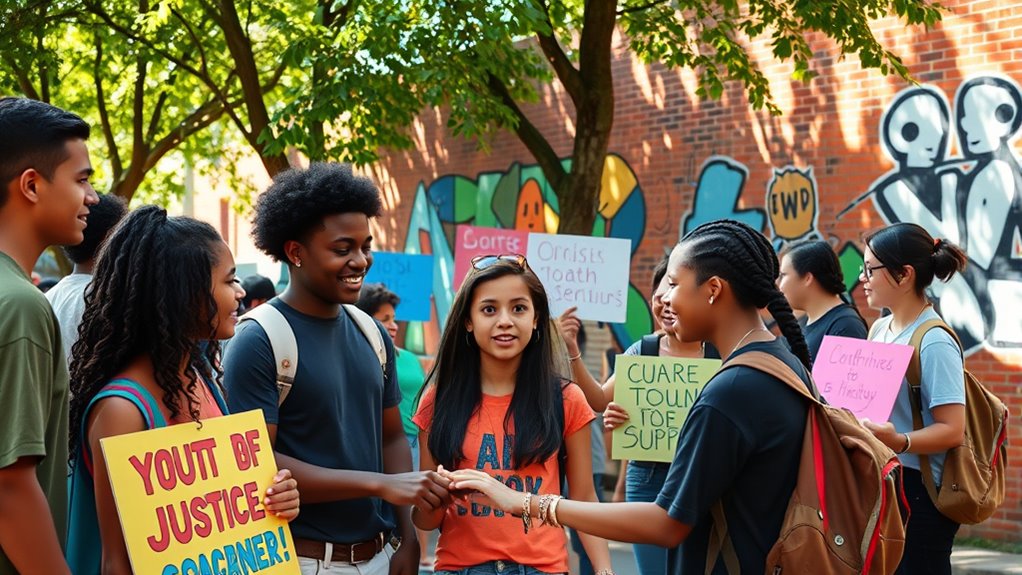You can empower teens to make a real difference by encouraging compassionate actions that foster social justice. Small steps like neighborhood clean-ups, advocacy on social media, or volunteering help them develop empathy and leadership skills. When teens listen to diverse stories and get involved in community projects, they build understanding and drive change. By combining empathy with activism, they create lasting impact. Keep exploring how guiding youth through these meaningful efforts can shape a better future.
Key Takeaways
- Encourage teens to participate in community projects to foster empathy and social awareness.
- Teach youth to listen to marginalized voices and support social justice initiatives authentically.
- Guide teens to start small, like social media campaigns or local activism, to build confidence and impact.
- Develop leadership and communication skills through involvement in clubs, meetings, and volunteer work.
- Emphasize the importance of combining empathy with activism to create meaningful, lasting societal change.

Have you ever wondered how teens can make a difference in social justice? It’s a question many adults ask when they see young people enthusiastic to create change. The truth is, teens possess incredible potential to impact their communities through community activism and empathy development. When you get involved locally, whether by organizing a neighborhood clean-up or speaking out about issues that matter, you’re practicing community activism. These actions may seem small at first, but they build momentum and show others that change is possible. As a teen, your voice matters, and your actions can inspire others to join in. Engaging in community activism helps you understand the needs around you and connects you to others who share your concerns. It’s not just about the immediate project but about cultivating a mindset of advocacy that can last a lifetime. Incorporating toilet functionality and maintenance knowledge can also teach responsibility and attention to detail, skills valuable in any activism effort.
Empathy development plays an essential role in this process. When you listen to someone’s story or stand with marginalized groups, you begin to see the world through their eyes. This deepens your understanding of social injustices and fuels your motivation to act. Developing empathy isn’t just about feeling sympathy; it’s about understanding real human experiences and recognizing the systemic issues that cause inequality. As a teen, you can volunteer at local shelters, participate in awareness campaigns, or simply have meaningful conversations with people from different backgrounds. These experiences broaden your perspective and help you realize that social justice isn’t just an abstract concept—it’s about people’s lives. When you approach activism with empathy, your actions become more genuine and impactful because they’re rooted in real understanding.
Starting with small steps is often the best way to grow your influence. You might create a social media campaign to raise awareness, join or start a club focused on social issues, or attend community meetings. Each effort adds up and shows that teens aren’t just passive observers but active participants in shaping their society. As you develop your empathy and engage in community activism, you also learn important skills like leadership, communication, and collaboration. These are essential qualities for anyone who wants to advocate effectively for social justice. Remember, your voice can amplify others’ concerns and help bring about positive change. When you combine community activism with genuine empathy, you create a powerful force for justice—one that can turn your passion into meaningful action that benefits your community and beyond.
Frequently Asked Questions
How Can Teens Effectively Start Social Justice Initiatives?
You can start social justice initiatives by engaging in community organizing and digital advocacy. First, identify issues you’re passionate about and connect with local groups or online platforms to amplify your voice. Use social media to raise awareness and mobilize others. Collaborate with peers, listen to community members, and plan actions that create meaningful change. Your active participation and dedication can inspire others and make a real difference.
What Are Common Challenges Teens Face in Social Activism?
You might face challenges like teen burnout, which can drain your motivation and energy, making it hard to stay committed. Lack of mentorship can also leave you feeling孤立 and unsure of your next steps. These obstacles can slow your progress, but seeking support from trusted adults and peers can help you stay resilient. Remember, addressing burnout and finding mentors are key to sustaining your activism efforts.
How Do I Address Peer Pressure Against Social Justice Efforts?
Did you know 60% of teens feel peer influence affects their decisions? To address peer pressure against social justice efforts, stand firm and remind your friends of your values. Discuss ethical dilemmas openly, emphasizing the importance of standing up for what’s right. Encourage respectful conversations and seek allies who support your cause. Remember, genuine change often starts with staying true to your beliefs, even when peer influence tries to sway you.
What Resources Are Available for Teens Interested in Social Justice?
You can explore youth-led organizations like Amnesty International Youth or the Young Women’s Leadership Network, which empower teens to get involved in social justice. Additionally, online campaigns such as Change.org petitions or social media activism provide accessible ways to advocate for causes you care about. These resources help you connect with like-minded peers, learn more about social issues, and participate actively in creating positive change.
How Can Parents Support Their Teens’ Social Justice Involvement?
Like Athena guiding Athena, you can support your teen’s social justice efforts through active parental guidance and emotional support. Encourage open conversations, listen without judgment, and provide resources to deepen their understanding. Celebrate their passion and efforts, fostering confidence and resilience. By standing beside them, you help nurture their commitment, ensuring they feel valued and empowered to make a meaningful difference in the world.
Conclusion
By embracing social justice, you hold the power to transform not just your community, but the entire universe! Your compassionate actions can ignite a cosmic wave of change so immense, it might even bend the fabric of reality itself. Never underestimate your voice—because when you stand for justice, you become a force so unstoppable, even galaxies tremble in awe. Keep pushing forward; your impact is greater than you could ever imagine.










